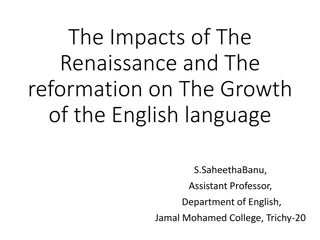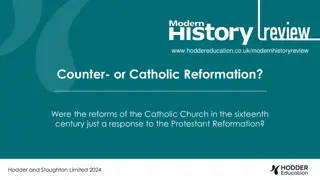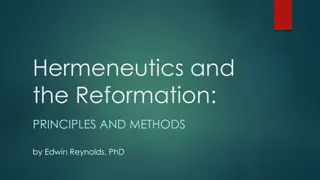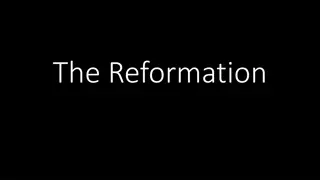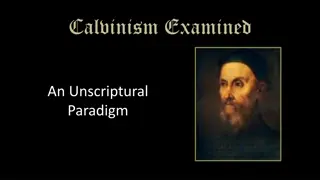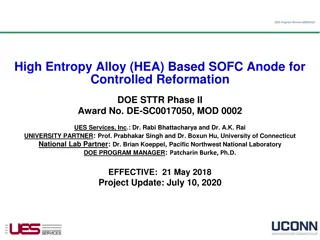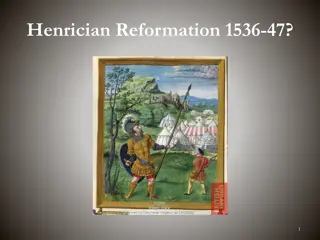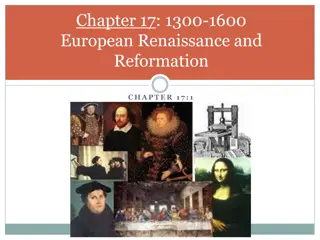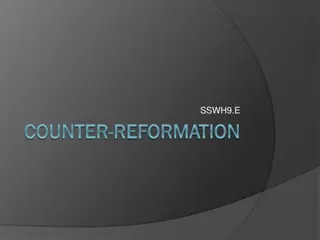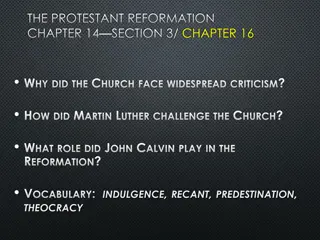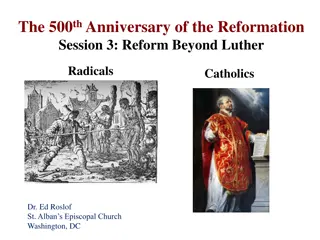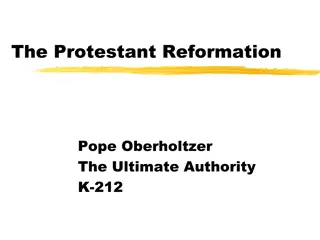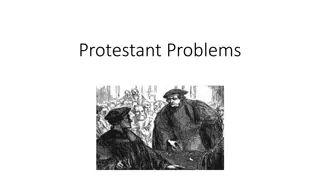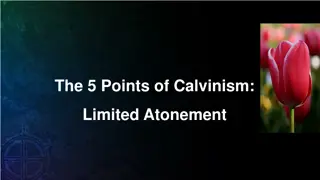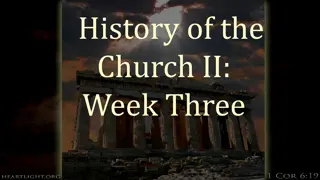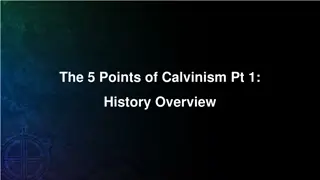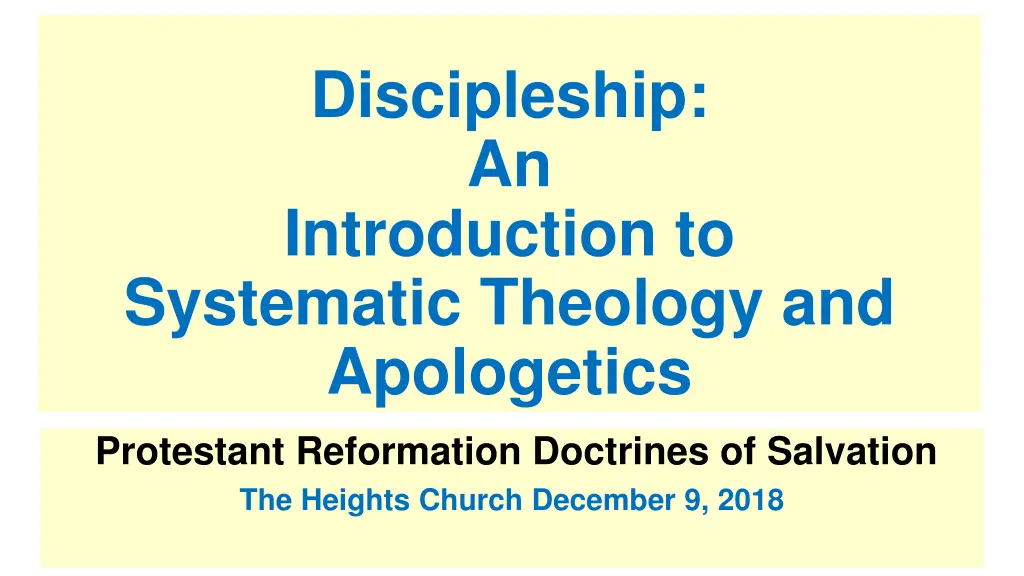
Reformed Doctrines of Salvation Explained
Explore the concept of Unconditional Election in Reformed theology, contrasting it with Arminian views. Dive into biblical passages and theological interpretations to understand the Protestant Reformation doctrines of salvation.
Uploaded on | 2 Views
Download Presentation

Please find below an Image/Link to download the presentation.
The content on the website is provided AS IS for your information and personal use only. It may not be sold, licensed, or shared on other websites without obtaining consent from the author. If you encounter any issues during the download, it is possible that the publisher has removed the file from their server.
You are allowed to download the files provided on this website for personal or commercial use, subject to the condition that they are used lawfully. All files are the property of their respective owners.
The content on the website is provided AS IS for your information and personal use only. It may not be sold, licensed, or shared on other websites without obtaining consent from the author.
E N D
Presentation Transcript
Discipleship: An Introduction to Systematic Theology and Apologetics Protestant Reformation Doctrines of Salvation The Heights Church December 9, 2018
Reformed vs Arminian Soteriology Unconditional Election And not only so, but also when Rebekah had conceived children by one man, our forefather Isaac, though they were not yet born and had done nothing either good or bad--in order that God's purpose of election might continue, not because of works but because of him who calls-she was told, "The older will serve the younger. "As it is written, "Jacob I loved, but Esau I hated." What shall we say then? Is there injustice on God's part? By no means! For he says to Moses, "I will have mercy on whom I have mercy, and I will have compassion on whom I have compassion." So then it depends not on human will or exertion, but on God, who has mercy. (Romans 9:10 16)
Unconditional Election - The Elect The English word elect is translated from the Greek word eklektos in the NT. In the NT words translated into English as choice, chose, chosen, or choosing are almost always of the same word family as elect. For example: And if the Lord had not cut short the days, no human being would be saved. But for the sake of the elect (eklektos), whom he chose (eklektos), he shortened the days For false christs and false prophets will arise and perform signs and wonders, to lead astray, if possible, the elect (eklektos)... And then he will send out the angels and gather his elect (eklektos) from the four winds, from the ends of the earth to the ends of heaven. (Mark 13:20, 22, 27)
Unconditional Election - The Elect The following NT passages are usually translated into English as some form of the English word family choose but do not come from the Greek word family of eklektos. "Behold, my servant whom I have chosen, my beloved with whom my soul is well pleased. I will put my Spirit upon him, and he will proclaim justice to the Gentiles. (Matthew 12:18) he was chosen by lot to enter the temple of the Lord and burn incense according to the custom of the priesthood, (Luke 1:9)
Unconditional Election - The Elect not to all the people but to us who had been chosen by God as witnesses, who ate and drank with him after he rose from the dead. (Acts 10:41) but Paul chose Silas and departed, having been commended by the brothers to the grace of the Lord. (Acts 15:40) If I am to live in the flesh, that means fruitful labor for me. Yet which I shall choose I cannot tell. (Philippians 1:22) But we ought always to give thanks to God for you, brothers beloved by the Lord, because God chose you as the first fruits to be saved, through sanctification by the Spirit and belief in the truth. (2 Thessalonians 2:13) She who is at Babylon, who is likewise chosen, sends you greetings, and so does Mark, my son. (1 Peter 5:13)
Unconditional Election - The Elect The 18 NT books that use words from the word family eklektos are: BOOK Matthew Mark Luke John Acts Romans 1 Corinthians 3 Ephesians Colossians # 4 4 5 5 7 6 Book 1 Thessalonians 1 Timothy 2 Timothy Titus James 1 Peter 2 Peter 2 John Revelation # 1 1 1 1 1 4 1 2 1 1 1
Unconditional Election - The Elect The nine NT books that do not use words from the word family eklektos are: 2 Corinthians Galatians Philippians 2 Thessalonians Philemon Hebrews 1 John 3 John Jude Of these only Philemon, 1 John and 3 John do not have a reference to the Doctrines of Grace, but they are authored by Paul and John who have many references in other books they authored.
Unconditional Election - The Elect Of the NT authors only Jude and the author of Hebrews do not use words from the word family eklektos. The number of uses by author is as follows: Author Paul Luke John Peter Matthew Mark James # 15 12 8 5 4 4 1
Unconditional Election - The Elect The Greek word prooriz is usually translated into English as predestined. It occurs six times in the NT. In five of these occurrences it is used in relationship to election: Romans 8:29 and 8:30, Ephesians 1:5 and 1:11 and 1 Corinthians 2:7. We have studied all of these except for 1 Corinthians 2:7: But we impart a secret and hidden wisdom of God, which God decreed before the ages for our glory. (ESV) OR but we speak God s wisdom in a mystery, the hidden wisdom which God predestined before the ages to our glory (NASB) In Acts 4:28 prooriz does not refer to election: to do whatever your hand and your plan had predestined to take place.
Unconditional Election - The Elect In addition the Greek verb to call kale occurs 147 times in the NT. In 31 of these uses it is employed as a metaphor for God s sovereign and effective action of bringing an individual to saving faith (Irresistible Grace). Of particular interest here are the NT books that do not use either eklektos or prooriz . But first as an example, kale is used in Romans 8:30 along with prooriz : And those whom he predestined prooriz he also called kale , and those whom he called kale he also justified, and those whom he justified he also glorified.
Unconditional Election - The Elect I am astonished that you are so quickly deserting him who called kale you in the grace of Christ and are turning to a different gospel (Galatians 1:6) To this he called kale you through our gospel, so that you may obtain the glory of our Lord Jesus Christ. (2 Thessalonians 2:14) Therefore he is the mediator of a new covenant, so that those who are called kale may receive the promised eternal inheritance, since a death has occurred that redeems them from the transgressions committed under the first covenant. (Hebrews 9:15)
Unconditional Election - The Elect The related noun (kl sis in Greek) occurs 11 times in the NT. There are 10 uses in which it is used as the salvific calling of the elect. I press on toward the goal for the prize of the upward call kl sis of God in Christ Jesus. (Philippians 3:14) To this end we always pray for you, that our God may make you worthy of his calling kl sis and may fulfill every resolve for good and every work of faith by his power, (2 Thessalonians 1:11) Therefore, holy brothers, you who share in a heavenly calling kl sis , consider Jesus, the apostle and high priest of our confession, (Hebrews 3:1)
Unconditional Election - The Elect A related noun kl tos and is used ten times in the NT. Jude, a servant of Jesus Christ and brother of James, To those who are called kl tos, beloved in God the Father and kept for Jesus Christ: (Jude 1) Thus we have now established that every NT Author includes at least one reference to the Doctrines of Grace. This reduces the list of books in the NT that do not use some form of chosen, predestined or called to four books (2 Corinthians, Philemon,1 John and 3 John). However, when we study the Doctrines of Grace we see Moral Inability (Total Depravity) in 2 Corinthians 4:3-6
Unconditional Election - The Elect And even if our gospel is veiled, it is veiled only to those who are perishing. In their case the god of this world has blinded the minds of the unbelievers, to keep them from seeing the light of the gospel of the glory of Christ, who is the image of God. For what we proclaim is not ourselves, but Jesus Christ as Lord, with ourselves as your servants for Jesus' sake. For God, who said, "Let light shine out of darkness, "has shone in our hearts to give the light of the knowledge of the glory of God in the face of Jesus Christ.
Unconditional Election - The Elect Finally as we have seen recently in Pastor Weyland s sermon series in Acts there are (indeed many) NT passage which do not contain the word s eklektos, prooriz or kale but reflect the Reformed understanding of Unconditional Election such as: And when the Gentiles heard this, they began rejoicing and glorifying the word of the Lord, and as many as were appointed to eternal life believed. (Acts 13:48) And the Lord said to Paul one night in a vision, "Do not be afraid, but go on speaking and do not be silent, for I am with you, and no one will attack you to harm you, for I have many in this city who are my people." (Acts 18: 9-10)

